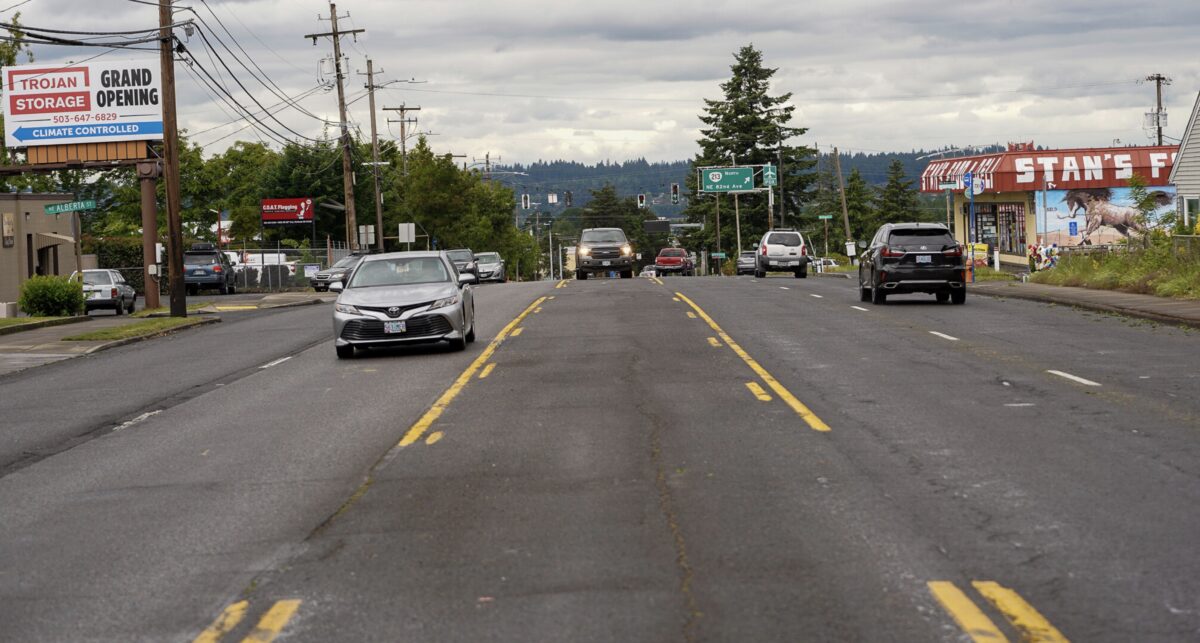
(Photo: Jonathan Maus/BikePortland)
The latest step in the transfer of 82nd Avenue from state to city hands is a request for proposals (RFP) released today by the City of Portland that seeks a consultant to change it from a busy, sprawling orphan highway dominated by drivers and surface parking lots, to a dense “civic corridor” full of people and multimodal activity.
The RFP also gives us new details on how the City of Portland plans to use the $185 million influx of funding 82nd has recently attracted ($35 million from Portland Bureau of Transportation, $105 million from ODOT, $80 million from the federal American Rescue Plan Act).
Calling it the 82nd Avenue Civic Corridor Transportation Investment Program, the City of Portland says the consulting agency who wins this $8 to $12 million contract will be responsible for creating a new design of 82nd that moves it toward becoming a “civic corridor” as envisioned in the city’s 2035 Comprehensive Plan and that aligns with previous plans already adopted by the city.
Civic corridor is a specific land use designation defined in chapter 3 of the Comp Plan. Here’s more from the plan:
Advertisement
“Civic Corridors are the city’s busiest, widest, and most prominent streets. They provide major connections among centers, the rest of the City, and the region. They support the movement of people and goods across the city, with high levels of traffic and pedestrian activity. Civic Corridors provide opportunities for growth and transit-supportive densities of housing, commerce, and employment. Development in Civic Corridors is intended to be up to mid-rise in scale, with lower scale generally more appropriate in locations far from the Central City or transit stations. Mid-rise development typically ranges from five to seven stories.
Abundant trees and high-quality landscaping beautify Civic Corridors and offset the impacts of their large paved areas. These corridors exemplify the benefits of green infrastructure by cleaning and soaking up stormwater runoff and minimizing urban heat island effects, while also being enjoyable places to live, work, and gather. Civic corridors are safe for all types of transportation. Civic Corridors policies apply to the roadway, the public realm of the street, and the buildings that line the street.”
Civic corridors are further defined in the Comp Plan as places, “that are attractive and safe for pedestrians while continuing to play a major role in the City’s transportation system.” 82nd is currently one of the most unpleasant and dangerous places for walking in the entire city.
The RFP specifically calls out four “overarching investment areas” that have extensive needs: safety, transit, maintenance/repair, and equitable development.
Another notable part of the RFP says the consultant might also lay the groundwork for a future project along the 82nd corridor that, “could include bus rapid transit or other transit investments as well as other potential changes to the roadway to fulfill the Civic Corridor vision.”
The RFP says the consultant’s work needs to be done by 2024 in order for construction to start by 2026.
See more details by downloading a PDF of the RFP here.
— Jonathan Maus: (503) 706-8804, @jonathan_maus on Twitter and jonathan@bikeportland.org
— Get our headlines delivered to your inbox.
— Support this independent community media outlet with a one-time contribution or monthly subscription.

